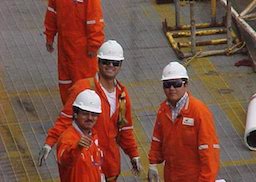Construction Project Management Basics
- Get link
- X
- Other Apps
Construction Project Management Basics
Construction project management is a complex field, requiring knowledge in many different areas like finance, mediation, law, business, and more.
For construction PMs just entering the field, here are the basic principles you should understand:
How to Obtain a Construction Management Project
The project owner will share project information to a large group of contractors, general contractors or subcontractors to solicit bids. The process starts with a cost estimate from blueprints and material take-offs, telling the owner how much money he or she should expect to pay in order for the contractor to complete the project.

There are two kinds of bids:
- Open bid: Used for public projects and usually promoted with advertising, an open bid invites all contractors to submit their bid.
- Closed bid: Reserved for private projects, a closed bid is when the owner sends invitations to a select number of contractors so only they are able to submit a bid.
Then, once the owner receives all the bids for the project, he or she can select the contractor through a number of ways:
- Low-bid selection: This method focuses on the project’s price. Contractors submit their bids with the lowest price they would complete the project for, and the owner chooses the contractor with the lowest one.
- Qualifications-based selection: This selection method picks a contractor solely based on qualifications. The owner will ask for a request for qualifications (RFQ), which gives an overview of each contractor’s experience, management plans, project organization, and budget and schedule performance.
- Best-value selection: Combining both price and qualifications, the owner looks for the contractor with the best cost and best skillset.
And finally, once the owner chooses a contractor, there are four different kinds of payment contracts they can agree upon:
- Lump sum: A lump sum contract is the most common. The contractor and owner agree on the overall cost of the project and the owner is required to pay that amount whether or not the project fails, or if it exceeds the initial price.
- Cost-plus-fee: The owner pays the total cost and a fixed fee percentage of the total cost to the contractor. This is the most beneficial contract for the contractor, since any additional costs will be covered.
- Guaranteed maximum price: The guaranteed maximum price contract is the same as the cost-plus-fee, except there is a set price so the total cost and fee cannot exceed.
- Unitprice: This contract is chosen when both parties are unable to determine the cost ahead of time. The owner provides specific unit price to limit spending.
Business Models for Construction Projects
While the bidding process typically stays the same regardless of the type of construction project, there are two forms of business models in the construction industry:
- Design, bid, build contracts: The most popular model of construction management, design, bid, build contracts allow the owner to choose a contractor after the design phase has already been completed by an architect or engineer.
- Design-build contracts: This model is the opposite of the design, bid, build contract. Design-build contracts are when the design and construction phases are completed by the same entity (referred to as the design-builder or the design-build contractor). This model is used to reduce completion date since the design and construction phases can happen at the same time.
Project Management Principles and Process
Once the bidding process is complete, the construction phase can begin. Although the phases of a construction project are different than traditional project management, they still include and follow many of the same principles.
All construction project managers should know the five phases of project management, as developed by the Project Management Institute.
Initiation
At the beginning of the project, you must create and evaluate the business case in order to determine if the project if feasible and if it should be undertaken. Stakeholders do their due diligence and feasibility testing may occur, if needed. If all parties decide to move forward with the project, a project charter or project initiation document (PID) is created, including the business needs and business case.
Planning
Next, the project team develops a roadmap for everyone to follow. During this phase, the project manager creates the project management plan (PMP), a formal, approved document to guide execution and control. The PMP also documents scope, cost, and schedule baselines. Other documents included in the planning phase include:
- Scope statement and scope documentation: A document that defines the business need, benefits, objectives, deliverables, and key milestones.
- Work breakdown structure (WBS): A visual representation that breaks down the scope of the project into manageable chunks.
- Communication plan: This plan outlines the communication goals and objectives, communication roles, and communication tools and methods. Because everyone has a different way of communicating, the communication plan creates a basic framework to get everyone on the same page and avoid misunderstandings or conflict.
- Risk management plan: This plan helps project managers identify foreseeable risks, including unrealistic time and cost estimates, budget cuts, changing requirements, and lack of committed resources
Execution
This is when the work begins. After a kick-off meeting, the project team begins to assign resources, execute project management plans, set up tracking systems, execute tasks, update the project schedule, and modify the project plan.
Performance and Monitoring
The monitoring phase often happens at the same time as the execution phase. This step is all about measuring progress and performance to ensure that items are tracking with the project management plan.
Closure
This last phase represents project completion. Project managers sometimes hold a post-mortem meeting to evaluate what went well in the project and identify failures. Then, the team creates a project punch list of any tasks that didn’t get accomplished, performs a final budget, and creates a project report.
New to Construction? Advice From the Experts
We asked six construction project management experts about their #1 piece of advice for people entering the field.
Here's what they had to say:

"My biggest piece of advice for people entering the field of construction management is to spend time on the job site observing the work being done and asking lots of questions. Get out in the field, get your boots muddy, and show respect to the trades who actually do the work of getting projects built. It's important that entry level CMs understand the many field elements, such as weather, site conditions, limited lay down space, traffic congestion, etc. that can impact cost, schedule, quality, safety, and the other project variables that CMs are responsible for managing."
Barbara Jackson, author of “Construction Management Jumpstart” and director of the Franklin L. Burns School of Real Estate & Construction Management.

“One piece of advice I could offer for those entering this field would be to ensure the flow of communication. Bad news is just as important as good news. Making sure all stakeholders in the project are aware of what is happening on the job will minimize the phone calls, emails, and conference calls in the midst of trying to fix or recover from an issue onsite.”
Dan Julien, prinicpal of Julien Management, a construction and project management consultant to some of the largest brands and high-profile individuals.

"The best piece of advice I can offer is that you commit yourself to on-going education. The construction industry is in the midst of change - cost, project delivery systems, technology, demographics, and, perhaps most important, sustainability ("green") expectations, are all impacting how projects are designed, built, managed, and financed. Successful CMs are nimble and informed and understand the implications of these many changes. The old way of doing things is disappearing; keeping up to date on everything from standards and codes, to construction practices, to collaborative project delivery and more will be required."
Alison Dykstra, AIA, founder of Kirshner Books and author of "Construction Project Management: A Complete Introduction" and soon-to-be-published "Green Construction: An Introduction to a Changing Industry."

"In construction management, the more we plan the luckier we get and the more successful our project becomes. Planning begins before starting the project, including; selecting the best construction methodologies, preparing the construction schedule/program and organizing resources. It also encompasses daily and weekly planning through the life of the project to ensure all tasks are completed.
"Construction is all about teamwork and good communication is essential for every project manager. You have to communicate with your team, subcontractors, suppliers, your client, designers, local authorities and sometimes neighbors and members of the public."
Paul Netscher, author of two construction project management books, including "Successful Construction Project Management."

"Never stop studying or analyzing everything you see in a project. Never take anything for granted. The construction management profession demands complete attention, great commitment and excellent learning and analytics skills. Live the project in its day to day and never forget to prepare for the unexpected."
Vicente Barrera, 18 years of professional experience in industrial construction and infrastructure. Currently a project manager for SENER, a private engineering and technology group.
Vicente Barrera, 18 years of professional experience in industrial construction and infrastructure. Currently a project manager for SENER, a private engineering and technology group.
“My biggest piece of advice: Never stop learning. That was actually one of the major reasons why we created Construction Junkie. The construction industry may still do some of the same things we've done for decades, but there's always room for improvement and things should ALWAYS be improving. Just look at the advances being made in concrete right now. Concrete has been used for centuries, but now scientists are figuring out ways for it to heal its own cracks and others are engineering ways to make permeable concrete strong enough for heavy concrete. If we stop learning, progress stops with it.”
- Get link
- X
- Other Apps
Comments